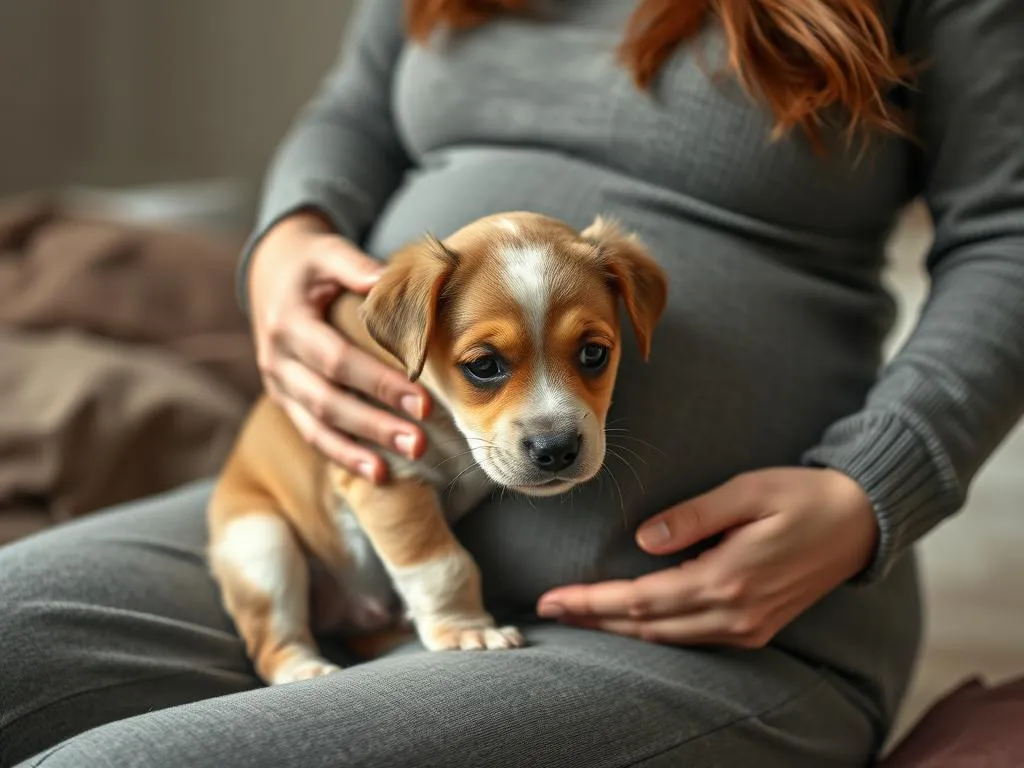
Welcoming a new life into the world is an exciting journey filled with joy and anticipation. Many families find themselves considering the addition of a furry companion during this time, prompting the question: is getting a puppy while pregnant a good idea? It’s a growing trend, with numerous families opting to bring a pet into their homes before their baby arrives. However, this decision comes with its own set of benefits and challenges that should be carefully assessed.
Considerations Before Getting a Puppy
Assessing Your Lifestyle
Before making the leap to add a puppy to your family, it’s essential to evaluate your current lifestyle. Getting a puppy while pregnant can significantly impact your daily routine and energy levels. Puppies require a lot of attention, training, and physical activity. You’ll need to consider how you will balance these needs with the demands of your pregnancy.
Physical activity is crucial for both you and the puppy. Regular walks and playtime will help keep the puppy healthy and happy, but you’ll need to assess your own physical limitations as your pregnancy progresses. If you anticipate that your energy levels will be low, it may be wise to delay getting a puppy until after the baby arrives.
Health Considerations
When considering getting a puppy while pregnant, it’s also important to understand the health implications. Some potential health risks associated with pets during pregnancy include allergies and zoonotic diseases—diseases that can be transmitted from animals to humans. Consulting with your healthcare provider is essential to ensure that you’re fully informed about any risks and how to mitigate them.
For instance, certain dog breeds are known to be more hypoallergenic, which may be a consideration if you have a history of allergies. Additionally, routine vet check-ups and vaccinations are crucial to minimize any health risks associated with bringing a new puppy into your home.
Financial Implications
Adding a puppy to your family involves financial commitments that go beyond the initial adoption or purchase fees. You’ll need to budget for ongoing expenses such as food, grooming, vet visits, and training. An estimated breakdown of potential costs might include:
- Adoption Fees: $50 – $200
- Initial Supplies: $100 – $300 (bed, crate, bowls, toys)
- Monthly Food Costs: $30 – $100
- Routine Vet Visits: $100 – $300 annually
- Training Classes: $150 – $300
Having a clear understanding of these expenses will help you make a more informed decision about getting a puppy while pregnant.
Choosing the Right Puppy
Breed Considerations
When it comes to getting a puppy while pregnant, selecting the right breed is crucial. Some breeds are known for their gentle temperament and adaptability, making them suitable for families with children. Consider breeds such as:
- Labrador Retrievers: Friendly and patient, they often get along well with kids.
- Golden Retrievers: Known for their gentle nature, they’re excellent family pets.
- Beagles: Energetic and friendly, they can be great companions for kids.
Look for puppies with a temperament that matches your family dynamics, focusing on gentleness and a manageable energy level, especially as your pregnancy progresses.
Adoption vs. Buying
Deciding whether to adopt a puppy from a shelter or purchase one from a breeder is another crucial consideration. Adoption is often more affordable and provides a home for a dog in need, while purchasing from a breeder may offer more predictability regarding the puppy’s health and temperament.
Regardless of your choice, prioritize responsible sourcing and ethical practices. Research shelters and breeders thoroughly, and ask about health checks and socialization practices.
Age of the Puppy
The age of the puppy can also influence your decision. Puppies require a lot of training and socialization, which can be a time-consuming process. Conversely, adopting an older dog may come with established behaviors and training, potentially easing the transition into your family.
If you opt for a puppy, be prepared for the extra work involved in training and integrating them into your home, especially while you are managing the physical and emotional demands of pregnancy.
Preparing Your Home for a Puppy
Creating a Safe Space
Before bringing a new puppy home, it’s essential to puppy-proof your living space. This includes:
- Securing electrical cords and dangerous household items.
- Establishing a designated area for the puppy with a bed and toys.
- Ensuring that hazardous substances are out of reach.
Essential supplies you’ll need include a comfortable bed, a crate for training, food and water bowls, and a selection of toys to keep your puppy entertained.
Family Dynamics
Involving current family members in the puppy preparation process can help create a sense of responsibility and excitement. This is especially important if you have children. Teach them about boundaries and how to interact with the puppy safely. Setting expectations for the puppy’s behavior and the children’s responsibilities will create a harmonious environment.
Training and Socialization
Early training and socialization are vital for a puppy’s development. Look for puppy classes in your area or consider online courses that can guide you through the training process. This is a great way to establish good habits from the beginning and create a well-mannered dog who can adapt to the new family dynamics when the baby arrives.
Managing Life with a Puppy During Pregnancy
Establishing a Routine
Creating a routine is essential for managing life with a puppy during pregnancy. Establishing a daily schedule that includes time for walks, feeding, and training will help both you and your puppy adapt to this new lifestyle. Consistency is key—this will not only aid in your puppy’s training but also help you maintain a sense of normalcy as you prepare for the arrival of your baby.
Balancing Responsibilities
Dividing responsibilities between partners can ease the burden of caring for a puppy while pregnant. Discuss each person’s strengths and preferences to determine who will take on specific tasks, such as feeding, walking, or training. Involving other family members can also help ensure that the puppy receives the attention they need without overwhelming any single person.
Preparing for the Baby’s Arrival
As your due date approaches, gradually introduce your puppy to baby items and sounds. Allow your puppy to explore baby toys and familiarize themselves with the new scents. This helps create a smoother transition when the baby arrives. Additionally, consider training your puppy to respond calmly to the presence of a newborn, which will be beneficial for everyone involved.
Post-Birth Considerations
Introducing the Puppy to the Baby
The first introduction between your puppy and your newborn should be carefully planned. Choose a calm moment, preferably when both the puppy and the baby are relaxed. Allow the puppy to sniff the baby, but always supervise interactions closely. It’s important to monitor the puppy’s behavior to ensure a safe and positive experience for both.
Adjusting to New Family Dynamics
Balancing attention between your puppy and newborn can be challenging, but it’s essential for maintaining a harmonious household. Establish routines for both the puppy and the baby to ensure that neither feels neglected. Having a clear schedule for feeding, walks, and playtime with the puppy will help maintain a sense of order and stability.
Ongoing Training and Socialization
Training doesn’t stop once the baby arrives. Continue working with your puppy to reinforce good behaviors and address any new challenges that may arise. Look for opportunities to socialize your puppy with other pets and families, ensuring they remain well-adjusted as your family grows.
Conclusion
Getting a puppy while pregnant is a decision that can bring immense joy and companionship to your family. However, it’s essential to consider various factors such as lifestyle, health, financial implications, and family dynamics. By choosing the right puppy, preparing your home, and establishing routines, you can create a nurturing environment for both your new pet and your baby.
If you’re feeling unsure, remember that seeking support from professionals and experienced pet owners can provide valuable insights and reassurance. With the right preparation and mindset, you can create a harmonious environment where both a puppy and a newborn thrive together.









